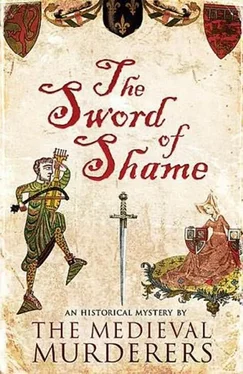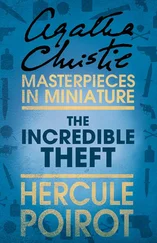The Medieval Murderers - Sword of Shame
Здесь есть возможность читать онлайн «The Medieval Murderers - Sword of Shame» весь текст электронной книги совершенно бесплатно (целиком полную версию без сокращений). В некоторых случаях можно слушать аудио, скачать через торрент в формате fb2 и присутствует краткое содержание. Жанр: Исторический детектив, на английском языке. Описание произведения, (предисловие) а так же отзывы посетителей доступны на портале библиотеки ЛибКат.
- Название:Sword of Shame
- Автор:
- Жанр:
- Год:неизвестен
- ISBN:нет данных
- Рейтинг книги:4 / 5. Голосов: 1
-
Избранное:Добавить в избранное
- Отзывы:
-
Ваша оценка:
- 80
- 1
- 2
- 3
- 4
- 5
Sword of Shame: краткое содержание, описание и аннотация
Предлагаем к чтению аннотацию, описание, краткое содержание или предисловие (зависит от того, что написал сам автор книги «Sword of Shame»). Если вы не нашли необходимую информацию о книге — напишите в комментариях, мы постараемся отыскать её.
Sword of Shame — читать онлайн бесплатно полную книгу (весь текст) целиком
Ниже представлен текст книги, разбитый по страницам. Система сохранения места последней прочитанной страницы, позволяет с удобством читать онлайн бесплатно книгу «Sword of Shame», без необходимости каждый раз заново искать на чём Вы остановились. Поставьте закладку, и сможете в любой момент перейти на страницу, на которой закончили чтение.
Интервал:
Закладка:

The Medieval Murderers
Sword of Shame
The second book in the Medieval Murderers series, 2006
THE PROGRAMME
Prologue-In which Michael Jecks tells of the creation of the sword and its first shameful use.
Act One-In which Bernard Knight’s Crowner John buys his officer a new sword, but soon regrets his generosity.
Act Two-In which Ian Morson relates Nick Zuliani’s deadly involvement in election fraud and murder in Venice in 1262.
Act Three-In which Michael Jecks’ Keeper Sir Baldwin and Bailiff Puttock learn how the sword could have been used in a martyrdom.
Act Four-In which Susanna Gregory’s Matthew Bartholomew and Brother Michael are sent to the remote Cambridgeshire village of Ickleton to investigate why the manor is behind with its rent. They discover passions and tempers running high.
Act Five-In which Philip Gooden’s player Nick Revill arrives at a snow-bound house to discover that, even after several hundred years, the Sword of Shame can still wreak havoc and murder.
Epilogue-In which Ian Morson comes up to modern times.
PROLOGUE
‘May I see it?’
Sir Ralph de la Pomeroy eyed his guest for a moment, then wandered to the chest that stood at the wall, its lock gleaming in the flickering light from the fire. ‘It’s a beautiful piece of work,’ he said.
It was still in its original, slightly scratched, leather scabbard, a simple enough sheath with bronze at the point and mouth. From it protruded an unadorned hilt with a simple disc pommel and cross-hilt fashioned to look like two dogs’ heads, mouths gaping. He took it up, hefting it in his hand again. Even with the scabbard covering the blade, it had a natural balance about it-almost a life . It felt as though it held a strange energy all of its own. His fingers tingled merely to grasp the hilt.
Sir Ralph passed it to the priest and stood away, still dubious about this man.
Bartholomew of Holsworthy was English, and Sir Ralph was not entirely sure where the man’s loyalties lay. He appeared always to be content with the change of government, but so many folk were still living out in the woods beyond the reach of the law that no one could be fully trusted. This man had lived here before the Norman adventure, and must have known and liked many who’d been executed.
The priest’s breath caught in his throat as he drew the blade from the plain sheath with its ox-hide covering. He traced the fine engraving and felt the thickening in his throat at the thought of the two brothers; he was forced to blink to conceal the tears.
‘I know this sword.’
The blade had been long in the making. Bran the smith had started work on this, his greatest undertaking, twenty years before the invasion.
Blond, heavy-set, with eyes the colour of cornflowers on a summer’s afternoon, Bran showed his parentage. His mother had been raped by Viking invaders during the worst of the reign of Hardacnut, the son of Cnut, who treated this kingdom like his personal purse. He was determined to rival the navies of the Vikings, and set about building many ships, and when the people complained bitterly at his sudden imposition of taxes, Hardacnut came marching with his men. One of them was Bran’s father.
His mother had enough love remaining in her for Bran, but after what the Vikings did to her family, wiping out all the menfolk, she had nothing but revulsion for those responsible, and the man who raped her beside the body of her murdered father was the focus of all the spite and bile in her damaged soul.
It was because of his conception that he had chosen to become a smith. Working in the fields with those who taunted him about his bastardy was impossible. In preference he chose the solitary work of a bladesmith.
Not that it had been a bad life. He was married to his darling Gytha, a dark-haired, slender, lonely woman who cared nothing for his birth, but only that he was a kind, gentle father to their children. Not many men were as lucky as Bran, he reckoned. A beautiful wife, two sons: one fair like Hardacnut’s men, the other more dark like Gytha’s folk. Curious how in his family the boys had taken on the appearance of their forebears.
Enough wool-gathering! The iron and steel had been heated, and now his eyes told him that they were at the perfect temperature. He began the long process of beating them together until the heat and the hammering welded them into one coherent strip. Then he hammered them again, reheated the resulting bar, and beat yet another strip of red-glowing metal to it.
After that he deliberately left it alone for several days. It was like a good cider, he always said-cider tasted better for being left to mature, and his blades strengthened with age. You couldn’t hurry a good blade.
It was almost two weeks before Bran returned to it. He took it in his hands and studied it critically. Wiping it on a corner of the great leather skin he used as an apron, he looked at it carefully before deciding how to proceed, and then set it back in his forge. First he rounded off the end which would become the point, and then he reheated it and beat it until the bar grew longer and flatter. The next day he began to give it shape, and he hammered the heated metal into a diamond section.
There were many more stages in the creation of the sword, each of them undertaken with the maximum of care, the swordsmith roaring and cursing when the coals flamed too hotly and the metal began to glow too furiously; taking the utmost caution to make sure that the metal was at the correct temperature at all times, never too hot, never too cold for the task at hand, and then the quenching, to give the metal its flexibility and strength.
The blade was finished. He had taken a week and a half just to smooth the rough metal with his big circular stone. While Dudda, his older son, cranked the handle, the smith ran the blade gently over the rotating sandstone, slowly removing burrs and imperfections. Then they went to the second, finer wheel, and began the smoothing and polishing process, the old smith frowning as he gazed at the metal while it changed from blackened, dull grey to a shining white steel. Still scratched, he set the blade on his workbench and began to polish it with his fine stones, while Brada, the fair-haired second son, sat in the corner of the room and played with off-cuts of metal.
And when all was done, he sat on a stool with a mug of ale in his fist and stared at the blade with pride, saying to his sons, ‘When a man holds this blade in his hand, he shall be invincible. No invader shall succeed against it. The man who wields it defending our country shall always overcome!’
When the invasion came, Bran was long dead.
On the ship, Rollo saw a great, thunderous, foaming immensity slamming down on the heads of the men before him. He had time, just, to grab at the mast as the grey/green flood poured towards him, drenching him in an instant.
Rollo fitzRollo, Breton staller to King Edward, set his jaw as he stared ahead between the men bent at the oars. He could show no weakness, not here on the ship with all his men about him. If they saw him worry they would panic. Even now he could see some eyeing him covertly as they strained against the waves.
Hunching his shoulders, he felt the full weight of his mail. It had been smeared with oil before leaving the port, as had his sword and his daggers, but the long byrnie felt as though it was more of an encumbrance than protection. He hated water. Water was the natural enemy of any warrior; how could a man fight when his mail coat and weapons were rusted? And a knight always feared the depths aboard ship, with twenty pounds of steel at shoulders and breast, drowning was inevitable. No, no warrior liked water, he told himself disconsolately, rubbing absent-mindedly at a patch of rust.
Читать дальшеИнтервал:
Закладка:
Похожие книги на «Sword of Shame»
Представляем Вашему вниманию похожие книги на «Sword of Shame» списком для выбора. Мы отобрали схожую по названию и смыслу литературу в надежде предоставить читателям больше вариантов отыскать новые, интересные, ещё непрочитанные произведения.
Обсуждение, отзывы о книге «Sword of Shame» и просто собственные мнения читателей. Оставьте ваши комментарии, напишите, что Вы думаете о произведении, его смысле или главных героях. Укажите что конкретно понравилось, а что нет, и почему Вы так считаете.












